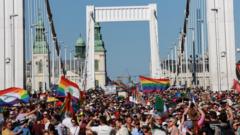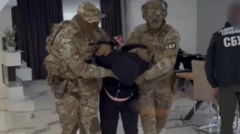Budapest's annual Pride march faces cancellation by police, but Mayor Gergely Karacsony vows to proceed with a "Day of Freedom," highlighting ongoing tensions between the government and the LGBTQ community amid new restrictive laws.
Budapest Pride March Faces Ban, Mayor Pledges Defiant Celebration

Budapest Pride March Faces Ban, Mayor Pledges Defiant Celebration
Budapest authorities clash over Pride event as police ban sparks resistance from liberal mayor.
In a significant confrontation over civil liberties, Hungarian police have announced a ban on the upcoming Budapest Pride march scheduled for June 28. Budapest's Mayor Gergely Karacsony has firmly opposed this decision, declaring that the city hall will organize the celebration regardless. "Budapest city hall will organise the Budapest Pride march as a local event on 28 June, Period," Karacsony asserted, challenging the government’s attempt to thwart the LGBTQ event.
This development follows a protracted struggle between the nationalist government of Prime Minister Viktor Orban and Hungary's LGBTQ community, supported by various legal battles in the courts. Tensions escalated earlier this year when Orban indicated that the Pride march would not occur and introduced a law conditioning gatherings on child protection regulations.
Karacsony contends that the police lack authority to suppress what he refers to as a "Day of Freedom," which is organized under the auspices of the city council and not subject to conventional assembly rules. An anticipated turnout from both domestic participants and international supporters is expected to reach into the tens of thousands. In a provocative statement, the mayor ridiculed the ban, suggesting authorities might as well "try to ban a procession of unicorns."
Following the new gathering laws enacted in March, police have indicated that participants identified through facial recognition could face fines ranging from approximately £14 to £420. Fidesz communications chief Tamas Menczer attempted to justify the measures, arguing the need to prioritize child welfare over what he labeled a festival inappropriate for children.
Despite these hurdles, the Rainbow Mission foundation orchestrating the Pride event, along with human rights organizations, has announced alternative activities for June 28 aimed at solidarity with the Pride movement. They have kept the authorities guessing about which events will actually represent the Pride march. Recent rulings by Hungary's Supreme Court have thwarted police efforts to block these gatherings.
The mayor's official declaration of a "Day of Freedom," complemented by live events throughout the day, is positioned as a non-Pride celebration with no explicit sexual components. The police have nonetheless raised concerns that any display, regardless of its nature, could infringe on the child protection law. Budapest police chief Tamas Terdik provided a comprehensive justification for the ban in a detailed legal document, underscoring the complexity of these legal confrontations.
In response to the potential legal backlash against participants, the Hungarian Helsinki Committee has advised demonstrators to refuse on-the-spot fines and to seek legal recourse should they receive notifications by post. Organizers believe a large turnout will complicate police enforcement, creating administrative burdens as both sides prepare for the unfolding events of June 28.


















